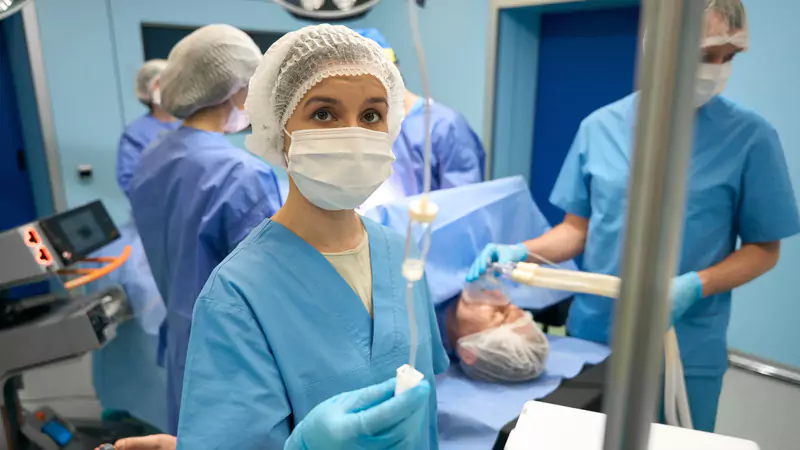Nurse Anesthetist: A Career of Precision and Impact
Key Points Section
- Nurse anesthetists (CRNAs) are advanced practice nurses who specialize in anesthesia and pain management.
- Becoming a nurse anesthetist typically requires a BSN, critical care experience, and advanced nurse anesthetist schooling that includes a specialization in anatomy and pharmacology.
- Nurse anesthetist salary is among the highest in nursing, often exceeding six figures, particularly due to the cost-effectiveness of their role in healthcare.
- CRNAs enjoy autonomy, collaborative teamwork, and a strong job outlook across various healthcare settings.
- Ongoing education, certification, and leadership roles can elevate a nurse anesthetist’s career and compensation.
Nurse Anesthetist: A Career of Precision and Impact

Ever wonder who handles anesthesia during surgery or complex treatments? That’s where a nurse anesthetist steps in as a vital member of the healthcare team, particularly in high-stakes situations requiring quick and effective anesthetic setup.
Also known as a certified registered nurse anesthetist (CRNA), this professional takes charge of delivering safe sedation and pain management while collaborating with surgeons and other healthcare experts.
With a high nurse anesthetist salary and a pivotal role in patient outcomes, nurse anesthetists enjoy both financial stability and meaningful work.
Their unique blend of technical know-how and compassionate care makes them essential across operating rooms, outpatient clinics, and specialized procedures worldwide, including emergency care.
What Does a Nurse Anesthetist Do?

A nurse anesthetist is responsible for administering anesthesia, monitoring vital signs, and managing sedation or analgesia during procedures, making them a crucial part of the surgical team.
They often work alongside anesthesiologists, providing airway support and adjusting anesthetics to keep patients safe and comfortable, especially during cardiothoracic procedures.
This anesthesia-focused skill set extends from preoperative preparation to postoperative recovery.
CRNAs also evaluate patient histories, watch for potential complications, and fine-tune anesthetic plans in collaboration with the anesthesiologist and surgical team.
Whether it’s an epidural for childbirth or general anesthesia for surgery, these advanced practice pros balance patient safety and pain relief at every stage of care.
Educational Path and Requirements

For many folks, the journey begins with a Bachelor of Science in Nursing (BSN), followed by time spent in critical care settings like the ICU, which is essential for further development in this field.
This clinical background lays the groundwork for handling complex patients and advanced monitoring techniques, both vital in nurse anesthetist programs.
Nurse anesthetist schooling typically culminates in a master’s or doctoral degree focusing on anesthesia principles, pharmacology, and physiology, with a strong emphasis on evidence-based practices.
After passing a national board exam, new graduates earn CRNA certification, meeting nurse anesthetist requirements and securing permission to practice independently.
How to Become a Certified Registered Nurse Anesthetist

If you’re curious about how long it takes to become a nurse anesthetist, expect several years of dedicated study, including hands-on training with anesthesia equipment.
Future CRNAs need at least one year of acute or critical care experience as registered nurses to ensure they have the knowledge necessary for their advanced roles.
During nurse anesthetist programs, students hone anesthesia delivery techniques through clinical rotations, simulation labs, and classroom instruction, all of which are essential for their professional development.
Once you complete your degree, you’ll sit for a certification exam to become a certified registered nurse anesthetist.
This credential signals you’re ready to tackle real-world cases, ensuring patient safety and effective anesthesia management in any clinical environment, much like a residency prepares a doctor.
Nurse Anesthetist Salary and Job Outlook

The certified nurse anesthetist salary is known to be one of the highest in the nursing field, often reflecting the extensive knowledge and skills required for the role.
Many CRNAs earn between USD $160,000 and $200,000 per year, depending on location, experience, and the type of unit they work in.
Factors like facility type, region, and years of practice can influence how much does a nurse anesthetist make in a specific area, contributing to their overall employment opportunities and specialization options.
With an ongoing demand for anesthesia services, nurse anesthetists benefit from strong job security and the ability to provide evidence-based care during emergencies.
If you search for nurse anesthetist jobs near me, you’ll often find positions in hospitals, surgical centers, and clinics eager to hire skilled CRNAs with expertise in evidence-based practices.
Tips for Success and Career Growth

Growing as an anesthetist nurse means staying ahead of medical advances, pursuing leadership roles, and possibly continuing your academic journey by earning a doctoral degree.
Joining professional organizations, collaborating with anesthesiologists, and participating in research can open doors to higher compensation, broader practice authority, and enhanced expertise in emergency care.
Remember to prioritize self-care, learn stress management techniques, and stay connected with mentors.
By nurturing these habits, nurse anesthetists keep their skills sharp, maintain a positive mindset, and forge a long-lasting impact on patient safety and satisfaction.
Paving Your Path to CRNA Excellence

Becoming a nurse anesthetist offers an exciting blend of autonomy, strong earning potential, and meaningful collaboration within healthcare, particularly in specialized fields like cardiothoracic surgery.
Whether you’re curious about what does a nurse anesthetist do or how to become a certified registered nurse anesthetist, it’s a career of dedication, precision, and continuous knowledge acquisition in anatomy and pharmacology.
From nurse anesthetist school requirements to advanced anesthesia strategies, every step prepares you to deliver comfort and care to patients at their most vulnerable. In this high-responsibility role, your skillful hands and compassionate heart help shape a future of better surgical outcomes, improved patient experiences, and a stronger healthcare team, especially in emergency situations.

